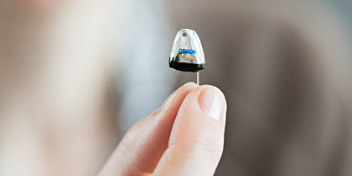Find out more about Oticon Zeal

Auditory processing disorder
What is auditory processing disorder?
Auditory processing disorder (APD) is a listening problem caused by the brain not processing sounds in the normal way.
Your inner ear is responsible for converting sound waves into electrical signals that are sent to your brain. APD is a problem converting these electrical impulses into meaning.
APD can affect both children and adults, whether they have any hearing impairment or not. This means that although the ears are working fine, the brain cannot process what it hears.
What are the symptoms of auditory processing disorder?
With APD, it may be difficult to understand speech when there’s background noise, if more than one person is speaking at a time, if the person is speaking quickly, or if the sound quality is poor (for example: over a loudspeaker or in an echoey room). It may affect your ability to pinpoint a sound (localise where a sound is coming from), tell which sound comes before another, distinguish similar sounds from one another (such as “hard” and “heart”) or enjoy music. There is no cure as such, although there are skills that people can develop to better deal with APD.

Who is affected and how is auditory processing disorder diagnosed?
The World Health Organisation estimate that 2–10% of children are affected by APD, which may be caused by regular ear infections, a severe illness at birth, (such as bacterial meningitis), a head injury or a genetic defect (it sometimes runs in families).
Adults may also be affected, as it can develop later in life and may be caused by age-related changes in the processing of sounds in the brain, a head injury, a stroke, a bacterial infection or any disease of the nervous system in which the myelin sheath of nerve cells is damaged.
You may be referred by your GP to an audiologist (hearing specialist) for tests which may include hearing tests, questionnaires, electrode tests (to measure your brain’s reaction to sound), and speech and language tests or cognitive (thinking) assessments.
Once auditory processing disorder is diagnosed, the cause can be then determined and, if necessary, treated.
How is auditory processing disorder treated?
While there is no cure for APD, but you can learn to live with it by making some changes to the way you listen. Auditory training relates to exercises you can do to improve listening and communication skills. Practising these exercises can train your brain to analyse sound better. It’s important to do this consistently in order to gain the most benefit and there are now many computer based training programs now available, such as Listening and Communication Enhancement (LACE).
Making changes to the environment can also help. Be aware of room acoustics and how they affect your ability to understand speech. Rooms with hard surfaces will cause echoes, so rooms with carpets and soft furnishings are normally much better for communication. Reduce unwanted background noise by switching off any radios or televisions and move away from any noisy devices such as fans or machinery. Try to position yourself so you can see and hear the speaker, take note of where the background noise is coming from and ensure it is behind you (music speakers in a restaurant for example). Try to sit in good lighting too.
Don't be afraid to ask others for help. For example, they can get your attention by calling your name before they talk, speak clearly and slower or emphasise their speech to highlight the key points of the message. A simple repeat of key facts can help but it may be necessary for them to rephrase the message. Remember that a lot of speech perception can be obtained by observing visual clues from the speaker so simply facing the speaker will help with understanding.



